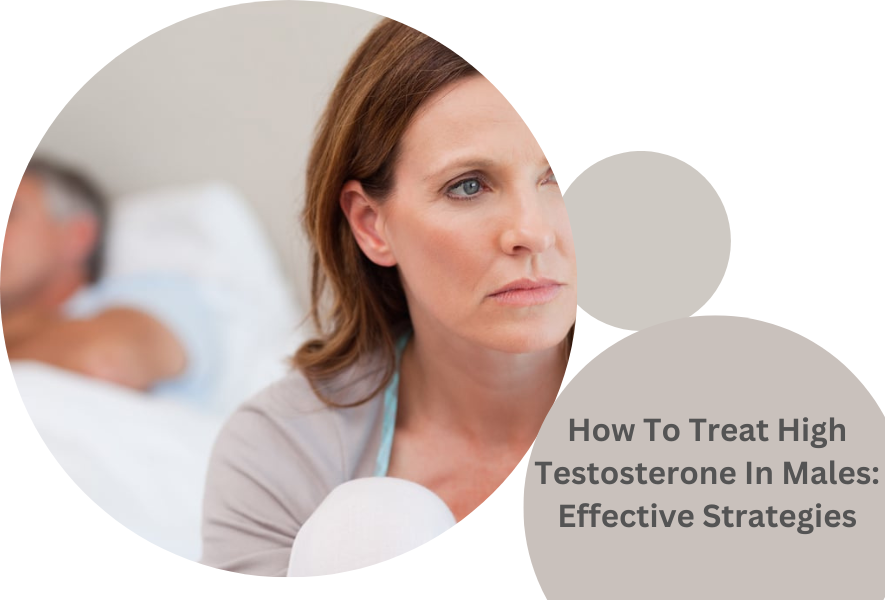Balancing High Testosterone in Men: Strategies for Optimal Health
High testosterone levels in males can be a complex issue, impacting everything from physical health to emotional well-being. While testosterone is crucial for male health, excessive levels can lead to a range of problems, including aggression, acne, and an increased risk of certain diseases. Understanding how to manage high testosterone effectively is essential for maintaining overall health and quality of life. In this blog, we will explore effective strategies for treating in males.
Understanding
Before diving into treatment strategies, it’s important to understand what high testosterone entails. Testosterone is a hormone produced primarily in the testes in males and is responsible for various bodily functions, including muscle mass, bone density, and libido. While normal testosterone levels vary, consistently high levels can disrupt these functions and lead to several health issues.
Symptoms of high testosterone in males may include:
- Increased aggression or irritability
- Severe acne or oily skin
- Hair loss or excessive body hair
- Enlarged prostate
- Decreased fertility
- Sleep disturbances
Understanding the root cause of elevated testosterone levels is crucial for effective treatment. It can result from several factors, including hormone therapy misuse, certain medical conditions like tumors, or lifestyle factors.
Medical Interventions
Consult a Healthcare Provider
The first step in addressing high testosterone is to consult a healthcare provider. They can conduct blood tests to measure your testosterone levels and determine if they are indeed elevated. This step is critical as it helps rule out any underlying medical conditions contributing to it.
Medication Management
In cases where high testosterone is caused by medication misuse, adjusting or discontinuing the use of such medications can help regulate hormone levels. If a specific medication is prescribed for a medical condition and is contributing to elevated testosterone, your doctor may adjust the dosage or switch to an alternative treatment.
Hormone Therapy
In some cases, hormone therapy may be prescribed to lower testosterone levels. This can involve medications that inhibit testosterone production or block its effects on the body. Medications like GnRH (gonadotropin-releasing hormone) analogs or anti-androgens can be effective in managing it. Your healthcare provider will determine the most appropriate treatment based on your specific situation.
Surgical Interventions
In rare cases where a testosterone-producing tumor is identified, surgical intervention may be necessary. Tumors can cause abnormal hormone production, and removing the tumor can help normalize testosterone levels.
Lifestyle Changes
Dietary Adjustments
Diet plays a significant role in hormonal balance. Consuming a well-balanced diet rich in fruits, vegetables, lean proteins, and whole grains can support overall health and hormone regulation. Certain foods, like cruciferous vegetables (broccoli, cauliflower) and flax seeds, are known to help balance testosterone levels.
Regular Exercise
Engaging in regular physical activity can help manage hormone levels. Strength training exercises, in particular, have been shown to regulate testosterone levels and improve overall well-being. Exercise helps reduce body fat, which can influence testosterone production.
Stress Management
Chronic stress can impact hormone levels, including testosterone. Incorporating stress-reducing practices such as mindfulness, meditation, or yoga into your daily routine can help maintain hormonal balance. Finding healthy ways to manage stress is crucial for overall health.
Healthy Sleep Patterns
Quality sleep is essential for hormonal health. Aim for 7-9 hours of uninterrupted sleep each night to help regulate testosterone levels. Poor sleep can disrupt hormone production and exacerbate issues related to high testosterone.
Alternative and Complementary Therapies
Herbal Supplements
Certain herbal supplements are thought to help balance hormone levels. For example, spearmint tea has been suggested to have anti-androgenic effects, which may help manage levels. However, it’s important to consult with a healthcare provider before starting any herbal supplements, as they can interact with other medications or conditions.
Acupuncture
Some studies suggest that acupuncture may help in balancing hormones, including testosterone. This alternative therapy involves inserting thin needles into specific points on the body to improve overall health and balance. Consulting with a licensed acupuncturist can provide more information on how this therapy might benefit you.
Monitoring and Follow-Up
Regular monitoring and follow-up with your healthcare provider are crucial in managing levels. This involves periodic blood tests to check hormone levels and adjust treatment plans as necessary. Ongoing communication with your healthcare provider ensures that the chosen strategies are effective and that any adjustments can be made promptly.
Conclusion
Treating high testosterone in males involves a multifaceted approach that includes medical interventions, lifestyle changes, and potentially alternative therapies. By understanding the underlying causes of elevated testosterone and implementing effective strategies, you can manage your hormone levels and improve your overall health and well-being. Always consult with a healthcare provider before making significant changes to your treatment plan or lifestyle to ensure that your approach is safe and effective.
By taking a comprehensive approach to managing high testosterone, you can regain balance and enjoy a healthier, more fulfilling life.


